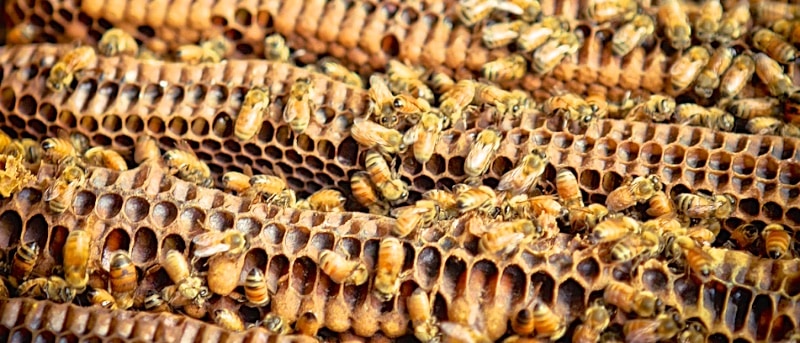
It’s fab, it’s new, and the honey flows straight into the jar. It’s so easy. But then, powdered instant potato is easy, too. Does that make it a good idea?
Despite my mission to focus on positivistic messages of change, at Milkwood we’ve got a charter of calling it like we see it.
And to call yet another plastic beehive addition which does not benefit the bees but only the beekeeper… what it is.
We’ve seen a lot (like, a LOT) of media about the Flow Hive ™ in this last week and after fielding a few hundred questions by email about what we think of it, we thought we’d spell it out.
The basic innards of the Flow Hive™ system seem to be sets of plastic half-built comb, which face each other, and which the bees then finish off and connect up, fill with honey, and cap.
Then, when the beekeeper is ready, they turn a key, the two plastic hive foundations crack apart, the honey flows out down a channel and out a spout, into the jars provided below.
Is it good for the backyard beekeeper looking for a trophy moment? Heck yeah. The effect of the honey drizzling out looks great, and has caught imaginations world-wide.
SAVE THE BEES. Because anything (like, anything) that has to do with bees, or that uses bees, is good for the bees. Right?
Actually, no. Not so much.
Bees want to build their own wax comb. It’s part of the bee superoganism. The wax is literally built from their bodies.
The comb is the bee’s home, their communication system (which doesn’t work nearly as well if it’s made from plastic rather than bee-drawn wax, as discussed in Tautz), and functions as a central organ.
The comb is the bee’s womb – it’s where they raise their brood.
And given a choice, bees do not want a pre-built plastic womb, home or larder, any more than we would.
It’s the birthright of bees to build comb.
Natural wax comb, 100% bee-built, in a warré hive – the bees set their own cell size according to the season and the colony’s particular needs.
But that’s not all.
The other concern we have with this device is that it encourages + celebrates beekeeper-centric beekeeping, and infers that bee stewardship is totally easy. It’s all about the punchline.
Is it good for the bees? Who cares. We’ve got flowing honey.
Actually, this conversation is not just about the Flow Hive.
What we’re really talking about here is the wider, industrialised profit-driven approach to beekeeping (as exemplified by the langstroth hive design), which places production above ethics + long-term bee health.
The best analogy I can think of to demonstrate this point is battery egg production vs pastured egg production.
We now understand that just the laying of an egg is not actually an indicator of a chicken’s happiness, health or ethical treatment, nor is it an indication of the quality of the egg.
We just know that, unless they’re dead, hens tend to lay eggs.
They may not be healthy eggs, or healthy chickens, but we’ve got our eggs. So we’re all good, right?
Despite the fact that these eggs are produced in a deeply unsanitary, un-ethical production line where the animals in question can barely stay alive, to the point where they need regular chemical treatments to ensure they don’t turn up their toes completely.
On the other hand, in a happy pastured chicken setup, the chickens have what they need – light, air, worms, grass, company – a warm bed, and room to explore. Both the chickens, and the nutritional density of the eggs, are the better for it.
We all understand this difference, and the fact that healthy chickens means healthy egg eaters, and healthy farms and ecosystems.
Now take that analogy across to bees.
Do bees want plastic foundations, plastic organs, queen excluders, their combs cracked open down the middle, regularly, while still in the hive, and all the rest? No, no they very most likely don’t.
Bees prefer natural wax comb that they draw themselves and renew when they see fit; to have the queen roam the hive and lay as that colony requires for long-term resilience; and for their hive to be sited in a permanent, sheltered setting.
Hmm.
The main push-back against natural beekeeping is the idea that anything that is bee-focussed is not as productive for the beekeeper, honey-wise.
Natural bee-built wax comb in a warré frame
With those goddarn happy bees spending all that time and energy building their own wax comb and doing things their preferred way, they’re not spending as much time foraging + filling those cells with nectar for the beekeeper.
Hey, guess what? It’s the same with chickens! If you put a chicken in a small cage and do not let it move so that all it does is eat and lay…. you get more eggs.
We seem to be deciding as a society, however, that for chickens, ethics may come before profits.
That we’d rather have eggs that cost more (partly due to production being less-per-chicken), are more nutrient dense and are produced by happier chickens.
So, despite that a purely profit-driven model of egg production would put all hens in battery farms, we’ve learned, as consumers, that there’s more to egg production than just producing eggs.
Everything is connected.
With bees and honey, however, we don’t yet apply that ethical lens.
They’re producing honey, aren’t they? The bees must be happy then. Output equals happiness.
Except that world-wide, honeybee populations say no.
No, actually, they’re not happy.
For a bunch of cumulative reasons, including profit-driven destructive beekeeping practices, we’re losing the bees.
You would think that this species would be at the top of our entire species list in terms of ensuring ethical and bee-centric stewardship + design.
You would think that we would be putting the bees health before, WAY before, what works best for us in terms of ultimate honey production.
Or what looks cool. Or something that allows us to draw honey directly from the hive via plastic foundation + spouts.
I’m sorry to be so blunt. really. I know that so many folks out there just want to help the bees, and that is awesome.
But the truth of it is – without bee-centric thinking, action, design + beekeeping, we may not be able to save the bees.
And if we continue to view bees and beekeeping as a gimmick or a system where honey harvest is paramount and the health + needs of this incredibly important species are secondary, we will deserve to lose them.
What you can do
Don’t take our word for it, go read up on bees as a species and a superorganism. Learn how amazing and essential they are to humans.
And get inspired to either steward bees naturally, or support folks who do.
Reference texts:
- The Buzz about Bees: Biology of a Superorganism – Jürgen Tautz
- The Bee-friendly Beekeeper – David Heaf
- Beekeeping for All – Emile Warre
- Toward Saving The Honeybee – Gunther Hauk
- Honeybee Democracy – Thomas D Seeley
Other Natural Beekeeping articles about the Flow Hive:
- The Flow Hive: a Solution in Search of a Problem
- The Deeper Message of the Flow Hive
- Flow Hive Frenzy
- Honey On Tap? – Bee Vlog Review
Further articles to read:
- Most Plastic Products Release Estrogenic Chemicals – EHP
- Natural Beekeeping – great resources over at Malfroy’s Gold
- It’s the birthright of bees to build comb
- The dark and the light: eating different honeycombs as part of natural beekeeping
- Natural Beekeeping Resources: best books
- All our articles about Natural Beekeeping
Addition: I can see from the comments below that there’s a fundamental mis-understanding about the nature of the honeybee superorganism in its natural state, as opposed to in a langstroth hive which was designed to be the ultimate hive design for industrial honey production, so let me spell it out:
In a natural hive, there are no supers, no queen excluders, and no artificial comb. The bees draw the comb from the top of the available cavity (tree hollow, warre box hive, etc) downwards, and the queen lays wherever she wants, which is usually in a tight pattern that moves down the hive with successive generations of brood.
In a langstroth hive, the queen and brood are confined to the very bottom of the hive, and the worker bees frantically fill the added empty boxes on top (supers) to try and replenish their much needed stores of honey (bees use honey as both a ‘thermal dome’ and also a fuel to keep warm during the cooler months).
The flow frames are designed to be added as supers to a langstroth hive. I am not saying that brood would go through the flow frames, as you can see the langstroth system doesn’t work like that.
What I am saying is that this new type of frame, by both it’s artificial nature, it’s promotion of ‘it’s so easy’ beekeeping, and it’s general promotion of langstroth beekeeping, is therefore encouraging a type of beekeeping that we, and many other natural beekeepers across the world, would put to you as not being best for the bees. At all.
And there is many other types of beekeeping, suitable for absolute beginners upwards, that achieve a low-intervention approach – while being infinitely more bee-centric than using flow frames (or any artificial comb frames). Ok. I hope that’s clearer now.
Photos 1+2+5 by the marvellous Cathy X
Just a last note that I do not think that it is the fault or the responsibility of the builders of the Flow Hive™ to entirely fix this societal issue that we face, in terms of how we value bees.
But I do think it’s up to all of us to advocate for and prioritise honeybee health above easy, plastic-driven honey harvests, flow hive or otherwise. Ok. Rant out.

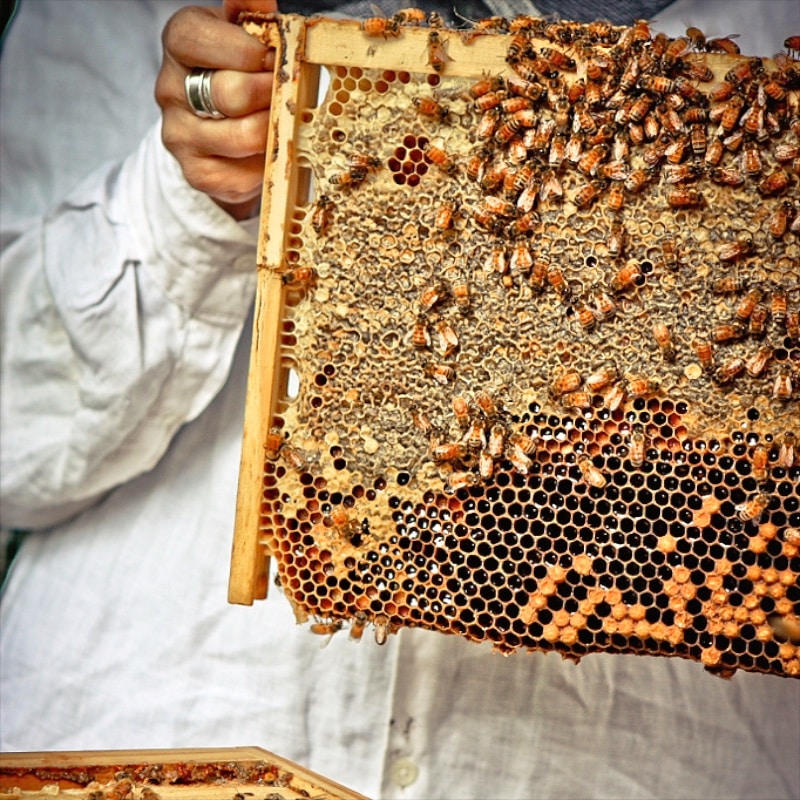
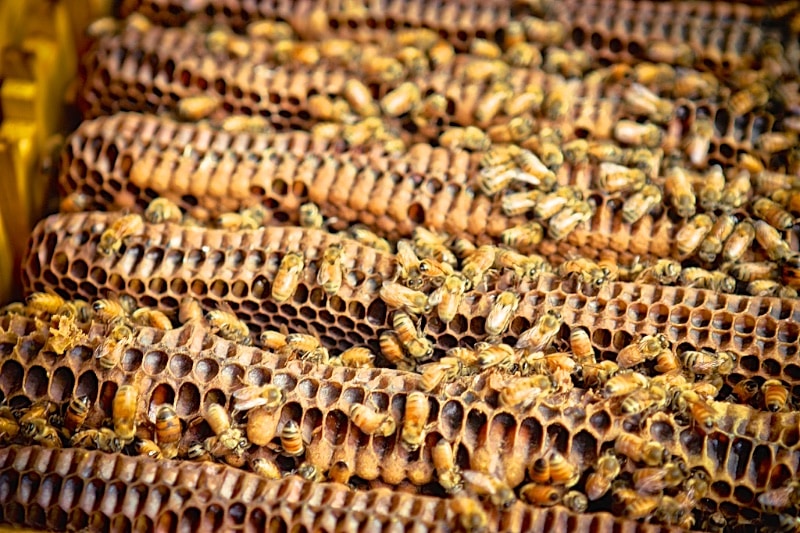
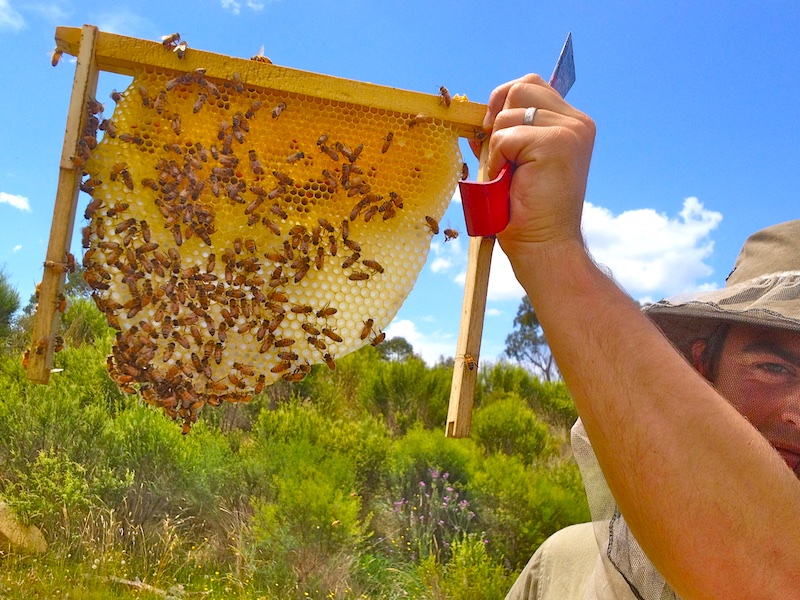
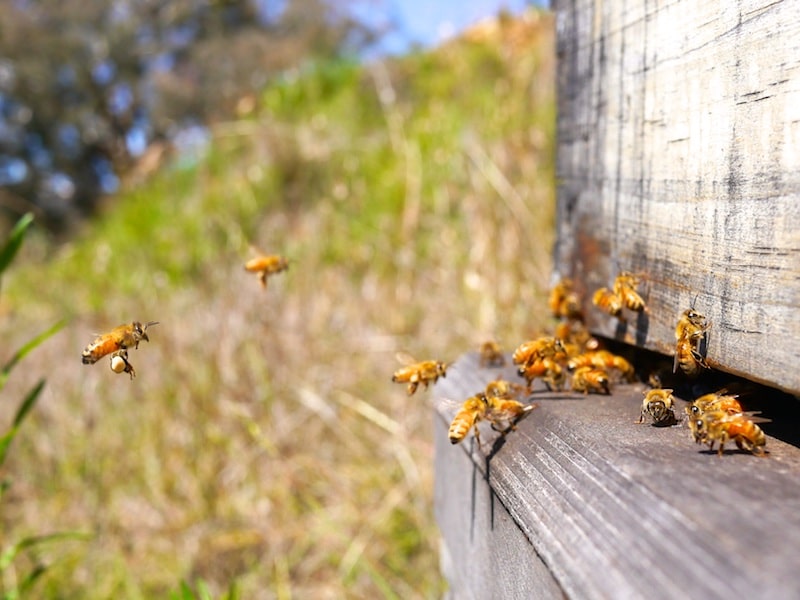
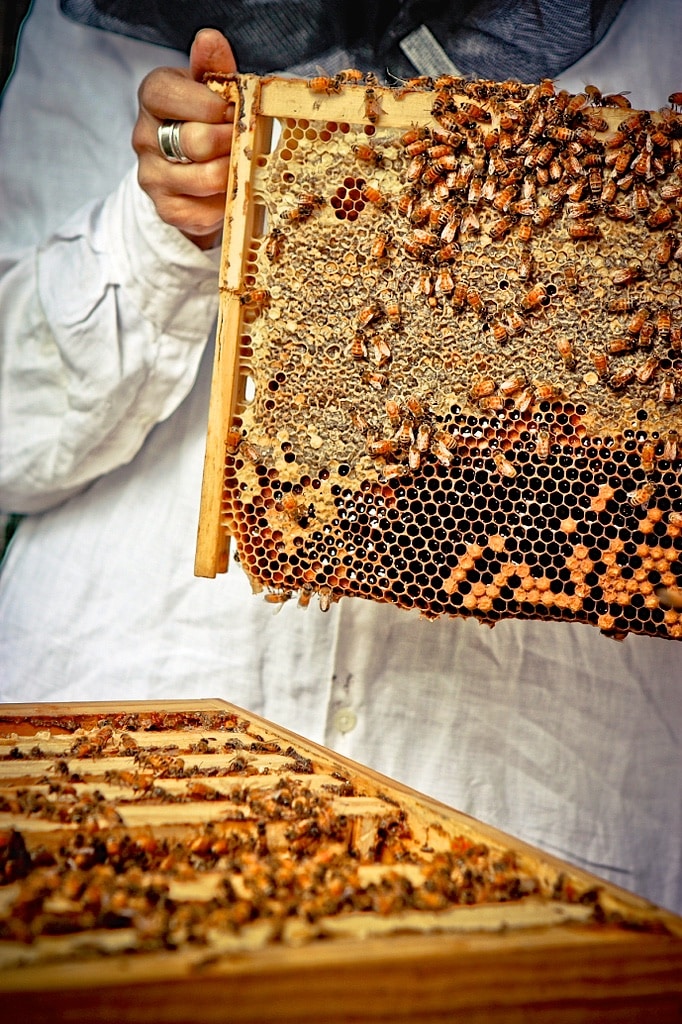
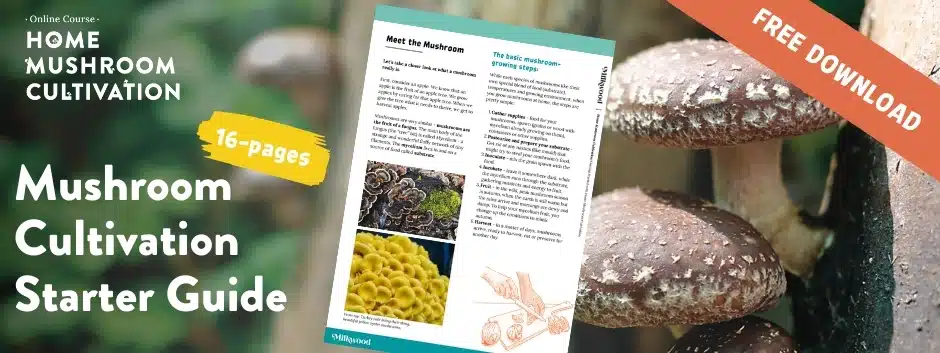



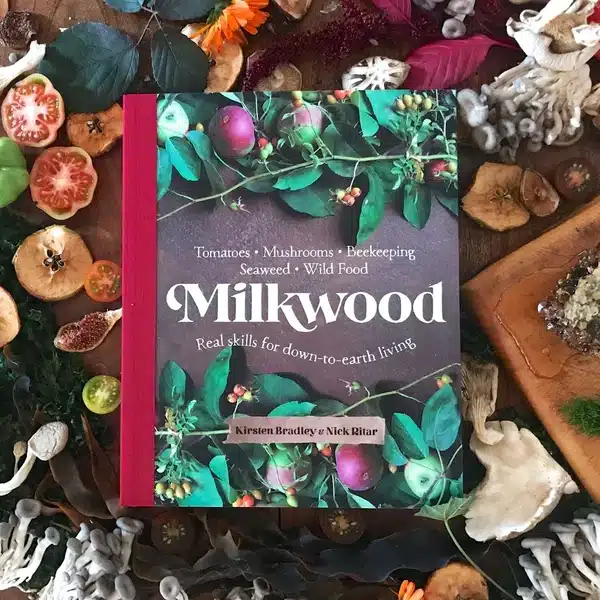
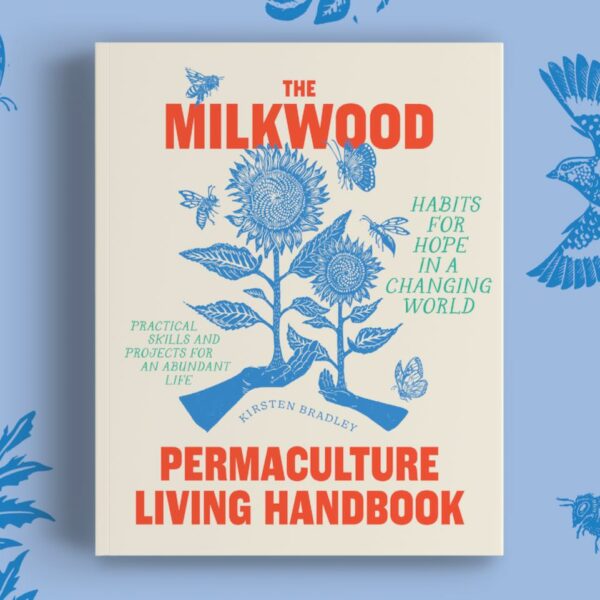






Thank you for this article now I know plastic is involved I feel you are right it is only going to benefit humans not the bees ,keep up the good work of awareness
Kind of weird that you assume bees prefer that you crack open their hive and rip out comb, agitating and likely crushing and killing some bees in the process, rather than harvest the honey without any disturbance to them at all. It’s my understanding the making comb takes a lot of energy for the bees which is why they reuse it given the opportunity. Giving them pre made comb saves them energy up front, and saves them having to rebuild what you harvest. I would absolutely move into a free, pre made plastic home given the chance. Horses for courses;… Read more »
allowing the bees to build their own natural comb, and renew it whenever they see fit, is essential to hive health, and honey can be harvested with minimal (like, very minimal) intervention by many other ways, without plastics.
this flow hive system does not mean you won’t have to open the hive – you still will, for all sorts of reasons. one of those being that it’s impossible to fully check for disease via a window – though windows are great for peeking at your bees.
This is an interesting opinion, but in no way, as far as I can tell, supported by fact. The Flow hive may be better or worse for bees than traditional hives. Time will tell, and what is needed is the combination of concern and objective information. Thank you for bringing up the concern, I think that perspective is important. The only sustainable relationship, however, is one that benefits both bees, and humans, and it remains to be seen whether the Flow hive fulfills that promise, or not.
um, which facts don’t you find supported? The argument is borne out by contents of the books at the bottom of the article – please feel free to read them – they are all by preeminent bee researchers.
All the references you provide – the books and articles – are all opinion pieces advocating a particular view. You need some hard science references that demonstrate what you say is true. That’s why people complain that your assertions aren’t supported. Maybe the books contain hard science references, but your article does not.
the top three book references are books on bee health + behaviour by bee scientists, not opinion pieces. and this is a blogpost, not a scientific paper. if you want references, I invite you to read the literature provided.
I wonder how cg got “all opinion pieces advocating a particular view” from the five books listed at the bottom of the article. The first is about bee biology and, being printed by the academic published Springer, seems unlikely to be advocacy.
The others seem to be about the nuts and bolts of beekeeping, and the only readily apparent advocacy might be in Toward Saving The Honeybee, which advocates… well, saving the honeybee. Of course, that’s written by Gunther Hauk, who has decades in apiary experience.
I think the flow hive system strikes a good balance. The plastic is only in the top (‘overflow’) super which still allows the bees to build comb in the bottom supers. Reducing the need to open the hive at the expense of having plastic in the top super is a good balance and less bees get killed which is surely a factor in the ethics of beekeeping?
you will still need to open the hive, it doesn’t remove that aspect.
…unlike a conventional hive? If weakest worried about bee happiness why do we make them live i prefabricated boxes? Why not let them build a hover a hollow tree trunk and leave them alone?
Yep fair call, and plenty of folks do that – there’s obviously a balance between keeping/not keeping bees at all. However, there’s some basic parameters we can adhere to when keeping bees that garner a honey harvest while still pertaining to the bees’ basic needs. which are stated above.
I’m only a noob beekeeper (3 years and counting), and I’ve made my fair share of mistakes, but really, if you’re killing more than a couple of bees when you open a hive, you’re doing something wrong and you’re going to have cranky, defensive bees.
The people here who are talking about “ripping out comb” and “crushing bees” are either ignorant of beekeeping or disingenuous.
… and that, really, is my beef with this product. They’re making extravagant claims about how much work it’s going to save.
Thank You Kirsten, very much for this article ….I got a bit trigger happy and posted about this new “Flow Hive”.before full consideration..I intuited that would be less bee centric and ignored my gut instinct to pass it over. Course corrected..Sticking with the Warre
i’m more concerned to learn about queen excluders etc., than i am with the plastic half-hive (willing to sacrifice purity for the good and having seen bees nest in all kinds of non-biodegradable places, by choice — but not without a queen). And i had the same question as “j” above as to what difference it makes to the bee how the honey gets harvested … both seem bee-disruptive to me. But i’m glad to read an article that brings up the issues raised here. And thanks for it. Good food for thought.
I considered this also. It seems at first a great idea ,but I think sometimes when we fiddle with an aspect of nature , so we affect the product itself due to some weird unknown thing that we are yet to learn about. We really don’t know if the bee made wax may have a quality about it that changes the honey slightly , makes it easy to digest , creates those magical antibacterial qualities. I also wouldn’t like to be a happy little bee inside there when the handle is turned.
A FLOW hive is not a “natural”environment for bees but then beekeeping is not natural either. Extracting honey by spinning frames is to a level interfering with the bees I have seen ( in Japan) where the bees where killed before the honey was taken. I have seen ( in Slovenia) where combs where crushed leaving bees to fix the mess. Beekeeping – other then wild harvest ( and having seen it in Cambodia I question this method too) is simply not “natural” I have not seen ( other then videos) a FLOW hive. I have questions, I have concerns… Read more »
oooo what a thought provoking post! I like critical thinking (as opposed to what I call ‘ra-ra’, cheerleader, pollyanna-esque rhetoric) — I have been interested in the ‘flow hive’ idea — I’m not a bee expert (or even a beekeeper — I’m intensely allergic to bee stings sooooooooo no bees for me!) — I like the point you make about having plastic in the hive…. mmmmmmm interesting. I’m not convinced however by the ‘is it good for the bee or just for me?’ argument as I suspect that this would naturally lead to a conclusion that there are no real… Read more »
i think you can see it as a slippery slope, or a question of ethical animal stewardship – most of us understand that there’s ethical ways to steward + farm certain animals. So why not have that conversation about bees?
The point of looking nature from a commodity perspective is indeed valid. Nevertheless, the process of buidling man-made hives to get honey is of the same perspective one could say. Having designed something that could improve the efficiency of harvesting without disturbing the bees, does not make it more “commodifying” than normal hives I think. According to their tests with beekeepers (3 years) they have not observed any problems. In their FAQ they state: Do the bees willingly fill the Flow comb compared to the traditional wax comb? In many years of testing we have found the bees readily wax… Read more »
Hi Kostas – for starters, I’d refer you to Tautz’ ‘Buzz about Bees’ book – there are whole chapters about the complexity of beeswax and how it is integral to the communication of the superorganism.
eg Tautz said that bees create a resonant frequency inside the hive to communicate – he calls is ‘the comb-wide-web’. Plastic combs interfere with that, as do wax foundation in a wooden frame. Bees can chew away the wax to create holes, allowing resonant frequencies in a 4 sided frame. They can’t chew through plastic, therefore it affects communication.
Was Tautz not referring to brood comb?
Why would you think that, Max? Tautz’ research over many years at the University of Würzburg covers all aspects of honeybee comb and its functions within the colony. I am unaware of any distinction between brood comb and honey comb in his work which supports your reading. In a natural colony (and in a Warré hive), brood comb becomes honey comb in due course as the brood hatches; the cells are reused for nectar and pollen storage; the bees extend the colony downwards and the queen lays into the virgin comb. Then in winter the bees work upwards as they… Read more »
Great post. Natural comb is the primary defense system of the bee against pathogens. Somehow the cleverness of the flow hive has blindsided folks to what is actually good for the bee.
It is bizzare that people can think that plastic is better for the bees. The energy required to build comb is unknown, but it is a primary function of a young bee to make comb and a long establish genetic ‘muscle’ that must be exercised.
Great points Kirsten. Your sentiment reflects my own and on first hearing about the Flow Hive I was in two minds about it. My main concern is that it simplifies Bee Keeping for the masses …. which I feel is not a positive. When to steal honey and when to leave it, understanding your hives cycles and having a connection to you hive visually inspecting and monitoring its health is vital knowledge that I can only assume may be overlooked by people who’s only concern is obtaining a bounty without being stung.
I saw these Flow Hives in an article a couple weeks ago and am keen on the idea as I have always wanted to keep some hives of my own mostly for pollination reasons; the liquid gold is a bonus. The idea of reducing the amount of stress and the invasive nature of traditional methods harvesting appeals to me though, which is why the Flow hives seem like a great idea. But I understand your point. I would rather see natural comb to plastic any day and making comb themselves is a part of what they have evolved to do.… Read more »
Forgive my cynicism, but when the proprietors of an immensely lucrative new invention monitor its function over a number of years, the outcome is predetermined. There is no way they’re going to say “Sorry, guys: big mistake.”
I don’t think there is any predetermination about it; the colonies will judge for themselves if this new set up is viable long term. My purchase will be determined based on their health over time, not just some bandwagon fad.
Great post! It sounded like a good idea when I first read about it but no-one said anything about plastic. Just as well we have you to tell the full story.
Milkwood this just comes across as snarky, anti-innovation,ex city slicker snobbishness. For a group that supports the innovation of Joel Salatin ( btw chicken tractors are not natural habitat for red jungle fowl either) aquaponics (trout prefer rivers than small tanks), and the many other innovations you rightly support, you have dropped the ball on this one.
rather then see this as a threat to your “natural beekeeping” world view, embrace it as a new market opportunity, and bring a whole new generation of bee keepers through milkwood that have come to bee keeping through this innovation.
P did you read the article at all? This isn’t about holding up or tearing down world views or new market opportunities. I’m not trying to be snarky. I am however trying to plainly state that we need to get over our capitalist, industrial ag approach to beekeeping (which flow hive ties into – go do some reading on the birth of the langstroth system and why it began), and look at the fact that it’s time to move torwards an api-centric approach. For the sake of world pollination and other trifles like that. It’s actually entirely in-line with Joel… Read more »
Not only are they plastic combs, but bees produce comb with a variety of cell sizes, these plastic combs extend the one size fits all approach to bee keeping. That’s why we don’t use pre-printed wax foundation either or re-use ‘stickies’. All farming systems involve pushing organisms beyond their ‘natural’ state to gain a yield. The question becomes how far are you prepared to push the organism. We believe that bees have been pushed too far and that the flow hive is another example of this forcing of their function. from Mollison: Principle of Stress and Harmony Stress here may… Read more »
Might I also recommend Jacqueline Freeman. She is the only biodynamic and permaculture beekeeper that I can find. She is a lovely lady and her book was just published. On a side note, I don’t like plastic either but maybe a compromise for those wishing to get into beekeeping and doing things simply. Maybe use ONE Flow Hive device instead of 5 per hive box. Then the bees still have many of their own made combs and the beekeeper can get one jar of honey. Integrate instead of segregate. I am greatful this family designed this device, but they are… Read more »
I think we’ve done a fair bit of research, and have been doing so for quite some years now, on api-centric beekeeping. the beekeeper doesn’t need to use any flow frames to get their jar of honey, if they practice responsible beekeeping. And who said anything about buying impreganted queens in an api-centric beekeeping system? Yikes. Let the bees raise their own queen and let her do her own thing, and bring the genetics she sees fit back to the hive…
Thank you for your very sound rebuttal to the ‘flow hive’ information. Totally necessary for a balanced approach to keeping bees and keeping them healthy.
Many people know of our interest in bees and have given us articles or wanted to talk to us about the ‘flow hive system’ – now we have succinct supporting material to offer back.
I think the point about plastic has to be expanded. These are partial plastic combs on which the bees fill out with their own wax and then cap. The entire comb is not plastic. This is the same system MOST beekeepers use because it is a compromise between the beekeeper and the bee. I think focusing on the perfect at the expense of the excellent is short sighted.
I would argue that it’s a system that most beekeepers use because it is more profitable, and the bees usually seem to hang in there despite it.
And what I think is short sighted is thinking that this norm is fine to uphold into the future.
Yes, beekeeping is always a compromise between the bees’ needs (primarily, be left alone in a clean environment with plenty of forage) and the beekeeper’s (crop pollination and or honey). Every beekeeper has to decide where to balance that compromise. For me, plastic foundation is way too big an interference in the life of the colony, and these things aren’t plastic foundation, they’re plastic comb which the bees just finish off. It’s another big step towards artificiality. I don’t think these Flow Frames should be banned or anything, I just think that anyone needs to think carefully and look at… Read more »
Thanks Kirsten as usual you give us something to talk, think and do a bit of research about! I know this might sound silly or simple but if the bees didn’t k like the set up because of the cell size or because it interfered with communication wouldn’t they leave? I have never had anything to do with bees other than eating honey and being caught in a swarm but I was told that swarm was because the bees were moving to a new hive.
swarming is usually an optimistic act, and occurs when the colony is either very healthy and has out-grown it’s hive space, or when things are so dire the bees decide to abandon the hive.
The entire industrial beekeeping industry is built on what can bees can just barely put up with without carking it or leaving the hive – plastic foundations, supers, regular moves, methyl bromide, etc etc etc. hence the egg analogy. just because the organism has not left or died does not mean it’s in an ideal + healthy environment.
Can you share your source that proves bees need to build a wax comb to be content? Seems like inference of what you want the bees to want imo. I’ve been dealing with bees since a child. I’ve seen hives die out and be replaced with comb intact and a thriving colony emerge. I also know that unhappy bees will not stay not will they thrive. Honestly, I don’t see much hard fact in your response. Mostly just seems you and a select few others are angry that a bit of mysticism might vanish and more folks will start keeping… Read more »
go check out the books at the bottom of the article for how natural comb benefits the bee superorganism.
I don’t think comparing a langstroth hive with battery hens holds water. Surely if a colony is thriving with a queen excluder, frames drawn from foundation or even a Flow super then the bees are “happy”. The evolutionary imperative of a bee colony, just like a chook is to pass on their DNA. Do you let your bees reproduce “naturally” via swarming or do you take a human-centric view and manage their reproduction to suit you? After all honey bees are feral on this continent. Their value is to pollinate human crops. Feral swarms are known to take up hollow… Read more »
Good points.
We used to have beehives in many of the hollow around us – most have died due to the Small Hive Beetle.
One concern is that people with FLOW hives will not check their hives as regularly as they should and thus creating an EPI center for SHB.
The same of course hold true for some of the “Natural” beekeepers too.
I think it is too early to draw conclusions about the honey flow frames. I too am not keen on the use of plastic but then again i love the low impact to the bees when harvesting honey from the hive. My one fear with the honey flow hive is that non beekeepers will get one of these hives and think it is that easy and not inspect the hive for disease etc especially american foul brood that can do much damage if not monitored. I have order some frames that i will try out and see how it goes.… Read more »
yes, the renewal of comb takes work. That renewal process is also an important part of colony health. Should we devise a system where we insert plastic bones into a chicken so it can focus on meat production?
Hallelujah! Thank you for speaking up! Yes wax takes time and energy for bees to make. Replacing/ supplementing wax with plastic or reusing old honey comb does bees no favours. In so many common beekeeping practices we are encouraging bees to use those wax glands less and less…what impact is this having on the evolution of bees??…not hard to figure out i reckon. …And plastic? constantly kept at a balmy 35+ deg?? I wouldn’t drink water from it and i’d suggest its not doing any favours for your on tap honey either….can you still call it “organic” How bout we… Read more »
Hi Kirsten,
I’m the guy on The Bee Vlog video. 🙂 This is an excellent article, and thanks so much for the link! I’ve added your site to my feed reader so I can keep up to date on your articles. I look forward to reading more.
Thought provoking article. Just wanted to point out that in the letters section of the Flowhive website there’s a comment from Michael Bush, author of Practical Beekeeping, saying that the flow super’s cell size is deeper than “normal” and will therefore be undesirable for the queen to lay in,, meaning you won’t need a queen excluder. I don’t mention this to negate anything you’ve said, just for clarification. Again for clarification, it is also mentioned on the website that the super is usable on a Warre hive, with an adapter, this is not to say that it may be in… Read more »
If this system brings more bees to backyards, yey!
But…
If new owners of this great new techno glitzy hives would care to see what the bees think, put in some preped top bar frames into your new boxes next to the flow frames and give the bees a choice!
It’ll be great to see what they choose.
From my experience bees generally hate plastic foundation and only accept it after being pushed for a season or two!
This is an erroneous argument, chickens and bees are somewhat different. Sure there is plastic… FlowHivev2 could be made of glass in the future. Regarding bee stress, Have you seen cornucopia that is under the Flow Hive box?, seen the first image posted on the official FlowHive Instagram? seems like you either A) Didn’t do your research B) Don’t use the Trivium method of critical thinking or C) have acute tall poppy syndrome.
Yes, chickens and bees are different – but taking a destructive industrial profit-driven attitude to their outputs is the point I am making – it benefits neither species. Yep, I’ve done my research, and I don’t need to use the trivium or otherwise method of thinking to come to the conclusion that introducing plastics to the internal part of a superorganism is not something to be heralded or held up as a truly revolutionary and great idea. Nor is inferring that beekeeping is so easy you don’t have to do anything at all. And speaking your mind on a subject… Read more »
My view …
1. more bees and beeks is good
2. believing you need expensive and unnecessary doodads (like the flow hive) is generally bad
3. belief that keeping lovely bees can be ‘hands off’ or ‘no maintenance’ is bad
4. believing that you don’t need to learn and build relationships with your colonies is always bad.
Surely the bees would not make their home in a plastic hive if they did not like it there and were unable to function? Don’t bees move on pretty quickly if they are unhappy? From my observations animals, humans and plants all find the easiest route making sure they are still able to live and reproduce. If I opened up the doors to my house, the cat, dog,cow,horse and a million insects would all come flooding in to live in a man made environment where it’s comfortable. Your argument that compares cage chickens with bees is ridiculous because bees are… Read more »
I’m not comparing caged chickens with bees, happy or otherwise. I’m comparing an industralised system of egg production with an industralised system of honey production – both value profit over ethics.
I am trying to say maybe we should look at that fact, when it comes to bee stewardship, instead of what is fancy or new or makes the most honey.
Jen, moving to another site is immensely risky and energy-expensive for bees, they don’t just up and leave unless something is very, very wrong.
The process of swarming requires the whole colony to prepare intensively for weeks, during the swarming itself they are extremely vulnerable, and the likelihood of survival of the new colony is quite low.
Thomas Seeley had some stats on it, I think it’s something like 80% of new wild colonies don’t make it through their first winter.
Interesting counterpoint on the Flow Hive. I’m sure most of us agree plastic is not ideal and we want all creatures big and small to be happy and productive. I believe part of the concept was about not disturbing the bees.. not just about production. I still think this is a great idea and would like to see some ideas to improve it. This article seems to mostly poo poo the product without producing any independently-developed research or unique ideas. Do you have anything constructive to add to the discussion, or do you believe this product to be unworthy of… Read more »
please refer to the book references at the bottom of the article for alternative api-centric approaches and independently developed research. there’s stacks of it there.
I have been dismayed by the number of comments that call this article “unresearched”. But I am utterly stunned that a representative of any Permaculture organization would react to this article in such a way. Kerstin has obviously done her homework and has good instincts to boot. By the way, no reviewer of a product is required to offer primary source info (that would be extremely inefficient science and reporting!), if they have sources readily available. Above all, I cannot comprehend a supposedly educated permaculturist willing to condone the use plastics in contact with honey during production??? The toxins present… Read more »
Lucky there are other websites dedicated to Permaculture 🙂
Permies has an interesting discussion with lots of different points being made
http://www.permies.com/forums/posts/list/40/44308
David
I sort of half agree with everything you said but at the same time don’t agree with a word of it. Sure, the flow hive isn’t the answer and may not be prefect for everyone but if it gets more people interested in beekeeping, i can’t see that as a bad thing. I would imagine most people interested in it are “city people” who will get introduced to beekeeping via the flow hive and then go on to keeping native hives etc. I really don’t understand your concern with queen separators or pre made combs. Bees can still produce healthy… Read more »
there’s too much here for me to reply to tonight, but… feel free to browse the references at the bottom of the article re: queen excluders, set-size foundation + how that affects drone production + overall colony health. we allow our hives to re-queen themselves as needed, bringing in wild genetics from the surrounding area.
James, a Queen isn’t going to mate with one of her own drones, 🙂 firstly shes already mated on the wing and wont do it again in the hive. She/ they produce drones who leave the hive eventually and meet in a drone congregation area for other queens to mate with, so yes drones do increase genetic diversity…same as we need lots of blokes in this world.
Pre-made combs and foundation dictate to a colony their needs rather than allowing them to determine their own needs as a colony/ super organism.
Thanks for your clear thinking and well shaped ‘rant’ Kirsten. 🙂
Sound points Kirsten. It is clearly forcing the function. Why are some people so uncomfortable when the superorganism is spoken for?
Nice try Kirsten…to get people to perceive beyond the excitement of this product. To say what people don’t want to hear. Anyways… Of course the flow hive will work! But it is not the essence of apiculture. It is not the highest potential of human and bee co-creation and balance. Warre is out there on the list…and from all my research and studies on apicutlure, the work of Oscar Perone on what is called PermApiculture is what resonates the most with me. I highly suggest that people check it out. http://www.biobees.com%2Flibrary%2Fhive_perone%2FMaking-a-Perone-Hive.pdf&ei=OOXuVPbEPIX_UraDgLgG&usg=AFQjCNHW1Q7UrhUCPB30xlI2n5ULKmC1Ww&bvm=bv.86956481,d.d24 It has been promoted a lot in Latin America… Read more »
Reading all the social media stuff, none of it told me how the flow hive worked. I thought, This seems too good to be true.” Now I know it is. I will give up thoughts of switching to it and stick with my Warré and horizontal top bar hives.
Hear, hear. Great post. We have been brainwashed into universally accepting technological innovation as ‘progress’ and to stand in the way of the (human) progress is to be a Luddite. The features of new technologies are sold to us as ‘benefits’ without any any understanding of, or reference, to systemic impacts and unforseen consequences. Look at ANY technology and those impacts are there, the beneficial and the detrimental. Even where the detrimental impacts are seen to be limited to the natural world (and thus can be thought of, by some, as external to our immediate concern), they will eventually work… Read more »
I’m with you there, Tony.
The picture that the inventors’ website paints of honey harvesting is pretty disingenuous. It’s not like we’re raiding our hives every couple of weeks. Once a year for a strong hive is more like it, and that can easily be incorporated with the normal inspection regime, which beekeepers are supposed to do anyway.
And the actual harvesting ain’t that hard, and once you get the hang of it, not that disruptive to the colony either.
I think with Flow Hives there would be a strong temptation on the part of novices to over-harvest.
Give up honey. Let the bees pollinate.
What would Honey Barbara think?
Ah, Honey Barbara! What a legend.
This is such a great forum and good debate to be having. We all might learn a bit more about the world from a bees standpoint. As a beekeeper of just one year’s experience with a top bar hive (No foundation, no queen excluder, crushed comb for honey extraction) I share many of the concerns that Kirsten has expressed about this Flow Hive. of course it is exciting to think that we can all have our own hive and just turn on a tap for honey. It is also exciting to think there is a way of supporting the suffering… Read more »
I gotta say, regardless of weather I agree with the article or not, the tone it was written in was very repelling to me. It’s surely not necessary to be so snarkey to make your point.
After being swamped in marketing that it was the fabbest, newest, easiest, best thing ever, yep I feel a bit of ‘actually, maybe not’ was justified. In the same language. Especially as that’s my actual view on the situation.
While I respect your concerns that it may be unnatural the end result this invention may have is MORE BEE KEEPERS! Which, in my opinion is ABSOLUTELY NECESSARY RIGHT NOW. Let’s not forget the big picture. Whatever gets more bees in yards of the people, the better chance we will have to SAVE THEM. I’m in no way a troll for flow hive, I’m a small farmer who would like to keep more bees and see more bees in our world for as long as I live.
I totally agree – but it’s like any other animal stewardship. If you’re going to do it, for gods sake do it in a way that benefits the species, not goes against it.
I disagree. We don’t need more beekeepers at all in my view, we need more bee-friendly (and generally, pollinator-friendly) habitat.
If people want to keep bees, that’s great. I do, and I love it. But they should do the hard yards, get informed, then make an informed choice.
Hey thanks for the article! As a design engineer, a quick question that needs your expert knowledge: Would it solve many of these problems, to create a hive that was half plastic and half empty? And have twice as many hives? And allow space for the queen to roam that could be closed pre-pour while the transfer took place? From a point of no specialised knowledge, this seems to address most of the issues that were raised, but would love to know why not, to come up with a second iteration. Thank you!
So make a superorganism where only half the foundations of the internal organs have been replaced with plastic ones, instead? I would not say that’s a great idea.
Oh, I’ve been searching and waiting for something that didn’t hail the Flow Hive as the best thing to happen for beekeeping, and you’ve articulated wonderfully what I could not – the plastic made me very uncomfortable about it, alongside the fear of ill-informed beekeeping. People are saying that it’s a great way to see people interested in bees and beekeeping, but it should come alongside encouraging and providing great amount of information on beekeeping and things like bee-friendly gardening for those that claim this is a marvellous way to encourage bee populations. It’s interesting to see some of these… Read more »
i think it’s a brilliant invention. Less stress on the bees. Less getting stung. Less beekeeping equipment to purchase. Less putting smoke in the hive. More ppl willing to have backyard hives. More hives to aid in pollination. Easier way to actually see honey being oriduced without upsetting the hive. Man made hives aren’t natural no matter what they’re made of. Hive location, food/water sources, not being exposed to city mosquito spraying trucks, etc are far more likely to effect the health of the bees than a plastic hive that requires less disturbance to the hive to get honey…honey, the… Read more »
Yes, man made hives are not natural, no matter what they’re made of. but replacing parts of the superorganism’s organs with plastic is not the way forward, in our opinion. Decent bee stewardship will produce the same effect in terms of harvest etc.
“Go read the references at the bottom” is not citing research. Moreover, without making proper citation, you assume people will read those books and not come away with something different. I realize this isn’t a scientific paper but a blog post. And yet people have responded en masse to your claims, eliciting only “go read”. Please note I’m not saying your claims aren’t valid, but they aren’t presented that way. Presenting the commission of you knowledge and feelings isn’t presenting research. I’d also like to echo that a few years of testing has been done on this so far. There… Read more »
yep, this is a blogpost, so yes, i’m stating my opinion. the top three references at the bottom are 3 peer-reviewed + researched books on bees by bee scientists, if anyone wants to look into the needs of the honeybee superorganism further. some of the comments here indicate to me that knowledge of how the honeybee superorganism functions in its natural state are less than widespread. but that’s not the point of this piece, its me giving my opinion on why plastics in hives, and beekeeping that focusses on honey outputs only, need further consideration.
You aren’t the only ones sending up alarm signals. When we attempt to opt out of the relationship that we need to forge in order to work “with” nature to make the process easier for us, we are negating a most vital thing, we learn from the process as much as we learn from the results. Apparently this hive crowd funder has raised a HUGE amount of money. It would seem like people are willing to throw a lot of moolah around when it comes to “saving the bees”. Methinks this hives creators are just doing a “Bill Gates” and… Read more »
Having campaigned against industrial beekeeping for 15 years and having practiced, taught and written extensively about ‘natural beekeeping’ for a good part of that time (although I notice that I don’t get any credits in this article) I can understand the attitude of the writer, but not her logic. The Flow Hive clearly reduces human interference with bees’ lives by eliminating the need for bee-blowers, extractors, etc and the act of removing whole boxes of honey from hives. The plastic combs it contains are never used by the bees for brood, so arguments about ‘the bees’ womb’, cell size or… Read more »
Hi Phil! On your website, you state: “Here you can discover low-impact, low-cost, chemical-free, small-scale, ‘organic’, natural beekeeping, using simple equipment that can can make at home.” – do you see plastic flow comb and the requisite queen excluders fitting into that ethos? I am genuinely curious.
Kirsten, well done for initiating an important and thought-provoking debate. I’d be interested to hear a fuller response from you on Phil’s points rather than a deflection. The question of how these fit in to Phil’s view of natural beekeeping is a good one, since this is the central to the debate I think. The flow frames will inevitably find a place in the beekeeping world, so some positive thinking on how to incorporate them in the most bee-friendly manner is needed. Could you please elaborate on the assertion that queen excluders are essential with the use of plastic flow… Read more »
firstly, saying that something will find it’s place in the system and we must therefore look kindly on it and necessarily include it doesn’t wash, for me – extrapolate that across to any type of animal husbandry, gene patenting, chemical agriculture. whatever you like – just because something is invented, or in common practice, does not make it a good idea. in a warre system (and a natural hive), the bees tend to start at the top of their available cavity and build downwards – so the comb they draw has first brood, then honeystores in it, as the comb… Read more »
Thanks for the quick reply Kirsten. The point I was making was that given the huge interest (and investment), plastic flow frames are not going to dissappear from the world of beekeeping anytime soon. I was not suggesting that natural beekeeping critics condone them on this basis (obviously that is very silly). However, there is an opportunity to positively influence their inevitable use by advocating a best-practice with a bee-centric focus. I think this is a more powerful weapon for change than outright condemnation. I don’t think anyone adopting the Warré principles would be silly enough to nadir with flow… Read more »
That is my ethos. I don’t expect the rest of the world to conform to it. I note that you fail to answer any of my points.
I’m more than happy to answer your points, but i do feel the difference between your ethos and your statements seemed somewhat apart, and that your ethos itself summed up why this might not be a great idea. Secondly, i think the flow hive rhetoric is misleading – just because you don’t need to open a box to harvest a flow frame of honey doesn’t translate to no intervention beekeeping or not having to open the hive ever, at all. In a well-managed natural beekeeping system such as warre, as i’m sure you’re aware, it’s perfectly viable to keep the… Read more »
1. ” just because you don’t need to open a box to harvest a flow frame of honey doesn’t translate to no intervention beekeeping or not having to open the hive ever, at all.” Nobody – neither the inventors nor me, said any such thing. This is a straw man argument. 2. The Warre is a low-intervention system, but not one that works well everywhere, with all types of bees, and not one that is suitable for people with disabilities, due to the box-lifting involved. This is true of all vertical-stack bee hives. 3. You say “And as honeybees are… Read more »
er, I don’t know a single warré beekeeper in Australia who thinks it’s ‘not neccessary to know what is going on inside the boxes’… nor do we consider it non-intervention beekeeping – but 2 swift hive checks a year are usually plenty to check on colony health and harvest as necessary (and maybe another harvest during a eucalypt honeyflow, if the season is great – but harvests are the least bee-disturbing task in beekeeping, I’ve found, if done well)> The flow hive only eliminates a bunch of conventional beekeeping equipment, as far as I can tell – the comparison in… Read more »
As to your point 4, Phil: what Kirsten said. This talk of needing to buy a load of kit is just not true, frankly, if you’re not using full wired frames, and nobody in Warré beekeeping does. Perfectly adequate kit for a backyard honey straining operation: two food-grade plastic buckets (yeah, I know, but the honey isn’t stored in them), one stainless steel double sieve and one honey gate. The only other kit you need is a sharp knife. I’m guessing there’s one in your kitchen somewhere already. This straining method is enough to get over 90% of the honey… Read more »
Phil, What leads you to think that vibration based communication applies only to brood comb? After all, the physical separation of brood from honey comb is an artefact of modern beekeeping, not something that occurs in natural bee colonies. I’m interested to read your take on this because I have a great deal of respect for your work, but I disagree with you here. The Flow Frame *could* be used as part of an apicentric beekeeping approach I suppose, but what I am seeing in various sustainability forums that I subscribe to is an uncritical uptake of Flow Hives by… Read more »
You are making a number of unwarranted assumptions, seemingly based on your best guess as to other people’s reasons for backing this project.
As to why I believe that vibration-based communication is restricted to brood combs, that is what the research shows. Also, once honey is stored and sealed in combs, bees show no further interest in it until it is time to eat it. Unless someone comes along and tries to take it, of course.
Cheers, Phil.
I’m responding to observed behaviour. Admittedly, the sample is quite small (say 1000 or so people I’m in contact with through FB), but in the space of just a few days I’ve had several (let’s say 5–6, best guess), announce either that (a) they’ve bought a Flow Hive or (b) they’re going to. From other comments they’ve made (e.g. “I don’t know anything about beekeeping yet, but …”) I infer that they aren’t beekeepers.
Now, I don’t have concrete proof that my interpretation is correct, but it isn’t just a baseless assumption, it’s an inference.
Hi Phil, I’m more than surprised by some of your comments here. Please see some responses below to your points; “Having campaigned against industrial beekeeping for 15 years and having practiced, taught and written extensively about ‘natural beekeeping’ for a good part of that time (although I notice that I don’t get any credits in this article) I can understand the attitude of the writer, but not her logic. The Flow Hive clearly reduces human interference with bees’ lives by eliminating the need for bee-blowers, extractors, etc and the act of removing whole boxes of honey from hives.” Bee blowers… Read more »
Phil
I am shocked by your support of this hyped up plastic insert .
You are the person who introduced me to no frills natural beekeeping and you think a £300 super is a good idea ? What happened ? I could not be more surprised if you accepted sponsorship from monsanto !
I would prefer that people spent that money attending one of yours or other natural beekeeping courses .
David
What about having both Flow Hive and Warre’ frames in the same box..? This may allow the hive to produce its own wax comb along with a potentially more productive frame as well? Or, a Flow Hive Brood Box on top, or below, a more natural Brood Box? I have no doubt the natural wax honey would be a more nutrient rich product, but the whole hive may still be happy and healthy along with a more accessible product. Because lets be honest, if beekeeping is ALL work with very little honey only the bee enthusiast’s will keep it up.… Read more »
I wondered the same thing when I read the inventors’ claim that the Flow Frames will work with Warré hives. But Warré is about much more than the design of the hive. One of the key aspects is nadiring new boxes so that the brood zone continually moves downward into virgin comb, while harvesting top boxes when the honey store is surplus to the bees’ needs. Having a static top box seems to interfere with that rather neat arrangement. It would be interesting to know how the bees react, but I wouldn’t do the experiment on my Warré hives, personally.
Profit driven? Have you looked at what Milkwood charges for workshops? My word, that’s gotta bee the pot calling the kettle black. If you REALLY cared so much for bees, how’s about running some free or low cost beekeeping workshops so more real people can access beekeeping, instead of just cashed up Sydneysiders (the demographic of which btw, seems to be the target of your article). I’d like to see some empirical, peer reviewed research on your claims also. Bee good!
Hey there ben – firstly, i’m talking about the industrial beekeeping industry being profit-driven, at the expense of bee health. which it is. secondly, our beekeeping workshop prices are in-line with the DPI’s beekeeping workshops. thirdly, we do run low-cost Q&A beekeeping events regularly. And people travel from all over Aus to do these workshops, not just sydneysiders – and there’s more and more established beekeepers choosing to learn these techniques, which is fabulous 🙂
I think the $400 or so I spent on doing Tim Malfroy’s intensive 2-day beekeeping course back in 2012 (through Milkwood) was money well spent. That and the extensive background reading set me up with the knowledge I needed to start beekeeping. Seeing a shiny plastic gizmo and buying it online, without any prior knowledge or experience of beekeeping, is a waste of money. The buyer is going to get stung in more ways than one. I’m glad to hear of your life of moneyless altruism by the way, but personally I have to work for a living and get… Read more »
Loving all the discussion on To be a Flow Hive or not to be….that is the question. It”s like stepping into the abyss….my worry is the estogen in plastic that can release over time. There have been many sad tales of this interferring with nature…fish, aligators & humans. I guess it will bea wait & see as the wheels of profit in the honey industry turn. I do like the idea of increasing Bee populations…maybee workshops run in schools.
Hi Kirsten 1st of all, thank you for stating your educated opinion so clearly and in this case, against the public drift. It should not matter where the drift is going, true stays true. I am 110% behind dedicating to the bees, listening to what the bees need and want, not what I think they need or should want. LISTEN is the key to good beekeeping. Now a few critical points. I am a 8 year beekeeper myself, never treated any bee or honey with anything else but love and care. 1) I have yet to understand why it is… Read more »
for further reading about why natural comb is so important to the honeybee superorganism (apart from + beyond the fact that the comb is itself classified as an internal organ of that superorganism, something that the organism is far better suited to make than a plastic or other material insert), might i refer you to Tautz, for a start – and also Seely – and also my article here 🙂
Thanks Kirsten.
I started to read “The Buzz about the Bees” and it starts to dawn on me what you are talking about. These girls are amazing in so many ways. Situations like this one today humble me so much. And it is yet one more good reason why I Love this Beekeeping so much.
Thanks for sharing.
I hope we stay in touch.
Stefan
Hi Kirsten. Some great moral bravery displayed in sharing your opinion. …and I guess that is point I find missing in most of the above debate. As with climate change, we are too quick to revert to the ‘he-said, she-said’ debate over technical issues and science, without stepping back and looking at our human values and ethics. A decision to endorse the flow-hive or not would ideally be made on the basis of ethical and value-based alignment with truly sustainable system design, not on science, research and/or dollar driven economics. It will only be when humankind understands that we do… Read more »
Thanks for offering a useful critique.
The inventors of this product are people I know. Without giving too much private info to a public forum, I would like to provide a bit of perspective. They are the absolute antithesis to profit driven, big ag, animal enslaving people that you could imagine. They are people that are absolutely aligned and active with ecological, environmental and community enhancing principals. Do you use petrol in your car? Cedar doesn’t. Have you paraglided over a forest to expose a multinational mining companies lies in court? Have you been on countless daring missions for greenpeace? Do you grow your own veggies… Read more »
I am sure that is all plausible, but that’s not the point of my piece – it’s not about the people making the product – the point is that I don’t think introducing more plastics to a hive is a great idea, especially when an equivalent low-intervention, low stress beekeeping approach can be achieved with good sound beekeeping practice that is accessible to anyone who cares to learn. And lovely though these folks undoubtably are, the product they and their team are promoting (very skillfully) seems to be getting an overwhelming response from folks that see it as an ‘easy’… Read more »
Thanks for lifting the lid (a little) on the backgrounds of the designers Mick – it certainly helps lend some personality to the story. As I think we would all assume, it certainly does appear that the two guys involved have all the very best of intentions (although I would still question the profit motive – at $600USD a pop ‘someone’ is making some real money here I’m sure). I do agree with Kirsten though, that the backgrounds and motivations of the designers are separate from the ethical and values based merit of the flow-hive itself. If we keep making… Read more »
If you spent 10 years living on a shoestring while you perfected your design, would you elect to release it without patent? Getting a patent on a design is unethical? What would stop someone else patenting it with a couple of modifications? Making it cheaper is more ethical? Surely this would just encourage the ignorant masses that are the only people gullible enough to buy this. They will be scratching their heads as they unpack it, turn the tap and wait for the honey to come out. Money in the hands of ethical people is a positive thing unless of… Read more »